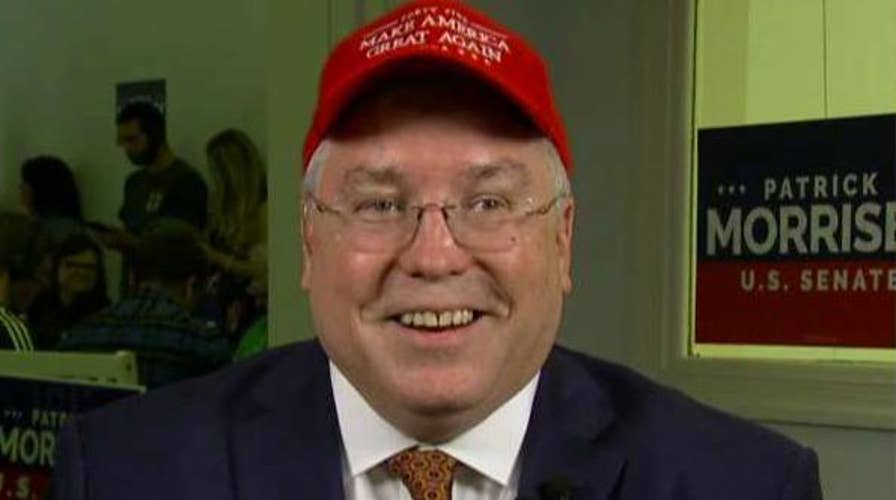Patrick Morrisey wins West Virginia Senate GOP primary
State attorney general defeats Congressman Evan Jenkins and former coal executive Don Blankenship.
Results of Republican primaries in four states Tuesday provided fresh evidence that President Trump changed the way to win a Republican nomination with his victory in the crowded 2016 GOP presidential primaries.
Candidate Trump spoke to Republican concerns for economic and personal security. His business background of creating jobs drove his wins among Republican primary voters, including social conservatives. His ideas for driving job creation centered on lowering taxes, reducing government regulations and getting fair trade deals for American workers.
Accordingly, Patrick Morrisey in West Virginia, Mike Braun in Indiana, and Jim Renacci in Ohio each followed the Trump playbook and won the Republican Senate nominations in their states Tuesday. They understood that connecting with voters on the issues that mattered most in deciding how to cast their ballots was the key to victory.
In West Virginia, Morrisey’s campaign pushed his support for lowering taxes, eliminating regulations put in place by President Obama and creating jobs. Morrisey defeated U.S. Rep. Evan Jenkins and former coal executive Don Blankenship, who sharply attacked Senate Majority Leader Mitch McConnell, R-Ky. in an insurgent campaign.
Republican primary voters in West Virginia heeded the guidance of President Trump, who urged them not to vote for Blankenship, saying Blankenship could not defeat Democratic Sen. Joe Manchin in the November election. Blankenship served a year in prison for a misdemeanor conviction of conspiring to violate mine safety laws involving the explosion at a West Virginia mine that killed 29 workers in 2010.
Patrick Morrisey in West Virginia, Mike Braun in Indiana, and Jim Renacci in Ohio each followed the Trump playbook. They understood that connecting with voters on the issues that mattered most in deciding how to cast their ballots was the key to victory.
GOPAC Election Fund polling found that 87 percent of Republican voters in West Virginia were less likely to vote for Manchin when they learn that he voted against President Trump’s tax cuts. This issue presents problems for Manchin with his own supporters, as 12 percent of Manchin voters are less likely to support him based on his tax vote.
The survey also discovered that more than 71 percent of Republican voters agreed with the following statement: “President Trump’s recent moves on better trade deals are designed to create and protect jobs. Fifty-three percent of total voters agree with this statement, including 60 percent of independents. Of note, almost 4 in 10 (37 percent) of Democrats agree with it as well.
In Ohio, Renacci’s first ad promoted his experience, stating his business was responsible for creating 1,500 jobs.
In Indiana, Mike Braun talked about bringing jobs that were lost to foreign countries back to his state and touted his success at creating hundreds of jobs.
The primary returns also offered a cautionary message to those candidates and consultants believing that simply repeating the refrain “drain the swamp” is the path to victory. As of this writing, only a handful of Republican incumbents at the federal or state level failed to earn Republican nominations. Republican voters may want to drain the swamp, but they haven’t concluded that their current lawmakers are the snakes and alligators that live there.
This is notable, as only one incumbent Republican U.S. senator avoided a primary challenge. Further, primary challenges to Republican state legislative incumbents has increased nearly 13 percent and contributed to the more than 17 percent increase in Republican primaries, according to Ballotpedia.
Indiana, Ohio, North Carolina and West Virginia have now launched us into the 2018 primary season. The results bring to mind the old saying “the more things change the more they stay the same.” Republicans who follow the path carved by then-candidate Trump and speak to voters concerns for personal and economic security will join the history being written of how to win Republican primary races.

